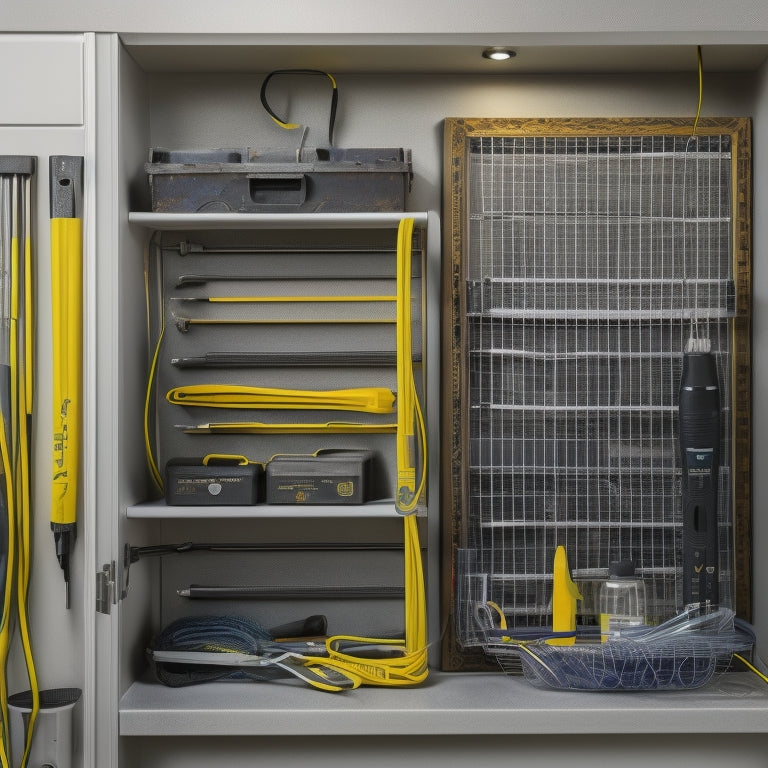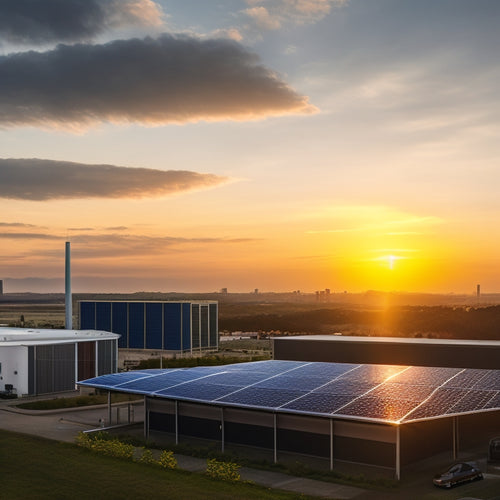
3 Essential Home Energy Panel Care Tips
Share
You'll want to clean your solar panels regularly to prevent dust and debris from reducing energy output by up to 25%. Use a soft-bristled brush or specialized tool, and rinse with water to loosen debris before cleaning. Next, monitor your energy output closely to guarantee peak performance, tracking production data daily, weekly, and monthly for anomalies. Finally, schedule regular inspections to identify potential issues before they escalate, checking for debris, wiring, and connections. By following these essential care tips, you'll be well on your way to maximizing your home energy panel's performance - and there's more to investigate to get the most out of your investment.
Key Takeaways
- Clean solar panels regularly to prevent energy output reduction and enhance performance by up to 10%.
- Monitor energy output daily, weekly, and monthly to identify potential issues and optimize production.
- Schedule regular inspections to confirm peak performance, identify potential issues, and prevent overcharging.
- Use soft-bristled brushes or specialized cleaning tools to avoid scratches and harsh chemicals.
- Review energy production data against expected metrics to ensure optimal solar panel performance.
Cleaning Your Solar Panels
Every six months, dust and debris can reduce your solar panel's energy output by up to 25%. To prevent this loss, you need to perform regular solar panel maintenance, including cleaning, as regular cleaning can enhance energy output by up to 10% clean your way.
You can clean your solar panels yourself using a soft-bristled brush or a specialized cleaning tool. Start by rinsing the panels with water to loosen any debris, then use a mild soap solution and a soft cloth to wipe them down.
Avoid using harsh chemicals or abrasive materials that can scratch the panels. For more thorough cleaning, you can use a hose with a spray nozzle to reach the entire surface.
Monitoring Energy Output Closely
Track your solar panel's energy output regularly to guarantee it's performing at its best.
You'll want to monitor the energy output closely to identify any potential issues before they become major problems. Performance tracking is essential to ensuring your solar panels operate at maximum efficiency.
Real-time monitoring with smart sensors helps optimize production and enables data-driven optimization decisions. By keeping an eye on performance metrics, you can identify degradation early and take corrective action.
Check your system's monitoring platform regularly to review energy production data, including daily, weekly, and monthly output. Compare this data to your expected energy output to detect any anomalies.
Scheduling Regular Inspections
Regularly, you should schedule inspections to confirm your solar panels are operating at peak performance. This proactive approach helps identify potential issues before they become major problems, guaranteeing your system runs efficiently and safely.
Regular monitoring of battery state of charge (SOC) and depth of discharge (DOD) prevents overcharging and undercharging battery monitoring and maintenance. Additionally, routine inspections are essential for peak battery condition; check for wear, corrosion, or damage, and create a maintenance schedule for voltage, temperature, and charge checks.
-
Check for debris: Verify your panels are free from leaves, dirt, and other obstructions that can hinder energy production.
-
Inspect wiring and connections: Confirm that all electrical components are securely connected and show no signs of wear or damage.
-
Verify system monitoring: Confirm that your monitoring system is accurately tracking energy output and alerting you to any performance issues.
Remember to take necessary safety precautions and consider hiring professional services if you're not comfortable with the inspection process.
Frequently Asked Questions
Can Energy Panels Be Installed on a Metal Roof?
You can install energy panels on a metal roof, leveraging its advantages like durability and water-tightness. However, you'll need to take into account installation specifics, such as specialized clamps and stands, to guarantee a secure and watertight fit.
Do Energy Panels Work During a Power Outage?
You're wondering if energy panels work during a power outage; unfortunately, they don't, as they rely on the grid's infrastructure to function. However, you can investigate power outage solutions, like energy storage systems, to maintain energy panel efficiency during outages.
Are Energy Panels Covered Under Homeowners' Insurance?
You're likely wondering if your energy panels are covered under your homeowners' insurance; the answer is yes, but it depends on the policy terms and conditions. Regular energy panel maintenance can also impact insurance coverage, so it is crucial to review your policy carefully.
Can I Install Energy Panels Myself to Save Money?
You're considering a DIY installation to save money, but be aware that it's a complex process requiring electrical and roofing proficiency. While it may offer cost-saving benefits, improper installation can lead to safety hazards and void your warranty.
Do Energy Panels Void My Roof's Warranty?
Did you know 25% of homeowners unknowingly void their roof warranty? You're smart to ask: installing energy panels might void your roof warranty, but proper energy panel maintenance can mitigate roof warranty implications, ensuring you're protected and powered.
Related Posts
-

Top 10 Off Grid Camping Gear Must-Haves
When you're off-grid camping, the right gear is crucial for a smooth expedition. Start with a durable, weather-resist...
-

Solar Powered Lights for Sustainable Home Decor
Solar-powered lights offer a stylish and eco-friendly way to enhance your home decor. They capture sunlight, converti...
-

Advantages of Commercial Solar Battery On-Site Storage
By investing in a commercial solar battery on-site storage system, you can greatly reduce your energy grid dependence...


